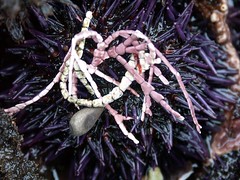Many of you are now familiar with the major ongoing and predicted impacts of global warming: warmer air temperatures, changes in rain and snowfall, melting ice, rising sea levels, etc.. A more subtle change which is taking place, and one that escaped serious attention until a few years ago, is the acidity of the oceans.
Acidity is usually measured in pH units, a metric of the amount of free hydrogen ions in the liquid; those little buggers cause a liquid to be acidic. The acidity of seawater is determined almost entirely by the amount of carbon dioxide being dissolved into it from the atmosphere. The carbon dioxide gas dissolves, and undergoes a series of somewhat complicated transformations to eventually yield, among other things, carbonate ions. The world's ocean is a vast volume of water, and it is normally buffered, meaning that it is very very difficult to alter its chemistry. The bright side of this is the fact that for a long time, the ocean has been absorbing a lot of carbon dioxide and heat from the atmosphere, and has therefore helped to slow down the impacts of our fossil fuel emissions. But, as I mentioned once before, there's no free lunch, and it seems that all good things must come to an end. So too with the ocean's gift. The ability of the ocean to absorb our bad stuff from the air is now declining rapidly; it's filling up! One consequence is that the pH is declining noticeably (lower pH = more acidic).
So what does this all mean? Technically, one major consequence is the decline in available carbonate ions in seawater. As the pH falls, more carbon dioxide enters a bicarbonate ion phase. And again you ask, WHAT DOES THAT MEAN??! It means this. Calcium carbonate ("chalk") is the material used most commonly by marine organisms to build their skeletons. Corals, clams, snails, many algae, and so on, use it. As the amount of carbonate ions in seawater declines, it will become increasingly difficult for these organisms to build, and even maintain, their skeletons. The skeletons will begin to dissolve. This is a huge and looming disaster. Coral reefs are the most diverse marine ecosystems, and are of tremendous economic value in the tropics. Microscopic planktonic algae with carbonate skeletons are the major producers of food and oxygen in the oceans. Clams are one of the major groups of algal consumers in the oceans, providing a vital link between the producers and consumers. Tens of thousands of years of accumulated carbonate skeletons in the ocean could begin to dissolve and release their carbon dioxide back into the atmosphere. Ocean acidity could well be the elephant in the room.
Is it all doom and gloom? Maybe not. It is shocking, personally shocking, that we know so little about the effects of pH on marine organisms. But unlike temperature and salinity, pH does not vary very easily, and so we scientists perhaps paid less attention to it. Now, new studies are suggesting that it's not all hopeless, and that the responses of organisms could be more varied than we realize. I'll talk about that in my next post, and we'll also chat about the last time that this happened, 55 million years ago.
